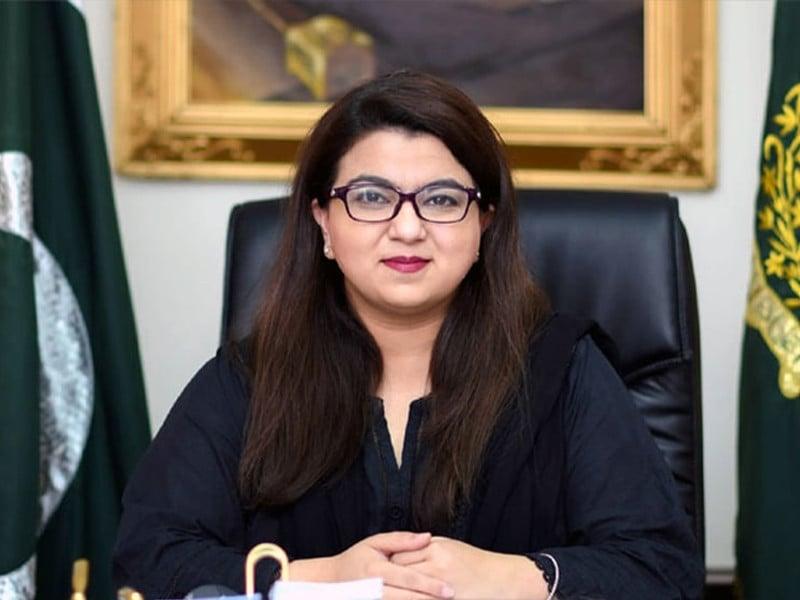Minister of State for IT Shaza Fatima said that the world’s largest submarine cable has reached Pakistan and there are high hopes that the internet problems will be resolved soon.
The Senate session, chaired by Vice President Syedal Khan, began with the address of Senator Mohammad Aslam Abro.
He mentioned that the ministry had stated that the internet problem was technical and while the world landed on the moon, Pakistan has not been able to solve this problem in a year. He suggested that the issue of Internet outages be referred to a committee.
Minister of State for IT Shaza Fatima said the PTA (Pakistan Telecommunication Authority) monitors internet speeds and in the last two years has doubled its frequency capacity. He mentioned that IT exports have increased by 33% in the last five months, becoming the only industry with a trade surplus. Furthermore, Pakistani internet users have increased by 25%.
He explained that most of the problems have occurred with mobile broadband, and are in contact with businesses related to the internet. Pasha (Pakistan Software Companies Association) mentioned that three companies are working across Pakistan on 274 MHz spectrum.
There are eight submarine cables, one of which has ended its useful life, and the world’s largest submarine cable has already reached Pakistan. He expressed optimism that the Internet problem would be resolved soon.
Senator Anusha Rehman noted that mobile phone companies had acquired 274 MHz spectrum in the last 30 years. He questioned the usefulness of imposing restrictions on data use. He asked if there had been any consultation on the new spectrum, especially whether it would encourage investment and the government’s plan to impose restrictions.
Shaza Fatima responded that the development of the mobile sector had not been that significant in the last two or three years. He mentioned that the PTA had hired consultants based in the United States and noted that things are changing globally. He highlighted that in some countries spectrum is no longer considered a revenue-raising tool; some even offer it for free. They are waiting for the consultants’ report.
Senator Zeeshan Khanzada highlighted that political instability in the country had led to these problems. While IT exports are increasing, he questioned whether the IT export growth target of ten billion dollars is still achievable.
Shaza Fatima responded by asking for documents showing that the IT export target reaches ten billion dollars. He mentioned that the housing societies had benefited from the STZA (Special Technological Zones Authority) in such a way that they converted it into a real estate business, deviating from its original intention.
Senator Quratulain Mari expressed concern about the lack of childcare facilities at airports. Azam Nazir Tarar responded that he had instructed daycare centers to be operational at airports as soon as possible. He added that similar facilities would also be installed in large bars.
Earlier, in a bid to address recent internet disruptions, the government launched the Africa Cable Project-2, a cutting-edge initiative designed to improve internet infrastructure and data transmission across the country.
The Africa-2 cable project is the largest submarine network in the world, spanning 45,000 kilometers. It covers 33 countries and incorporates 46 landing stations around the world, marking a major milestone for international Internet infrastructure.
A few weeks ago, Bilawal Bhutto Zardari warned that the digital space in Pakistan was under threat and urged young people to engage in “democratic and peaceful resistance” to secure digital rights, including high-speed Internet.
Sharmila Farooqi also expressed frustration during a meeting of the National Assembly’s Standing Committee on Information Technology, accusing the government of failing to address persistent internet outages.
The meeting, chaired by Federal IT Minister Syed Aminul Haque, focused on the issues of slow internet. Farooqi criticized Minister of State for IT Shaza Fatima for her responses, questioning the government’s claims about improving internet services.
Earlier, billionaire Elon Musk confirmed that Starlink has applied for permission to launch internet services in Pakistan and is currently awaiting government approval.
Musk’s confirmation came in response to a post by Pakistani netizen Sanam Jamali, who expressed hope that Starlink could help propel Pakistan towards a more connected future.
In a follow-up post, Jamali stated that Pakistan had approved Starlink’s entry and urged Musk to accelerate the launch, emphasizing the potential benefits of providing millions of people with better connectivity, education and opportunities.




